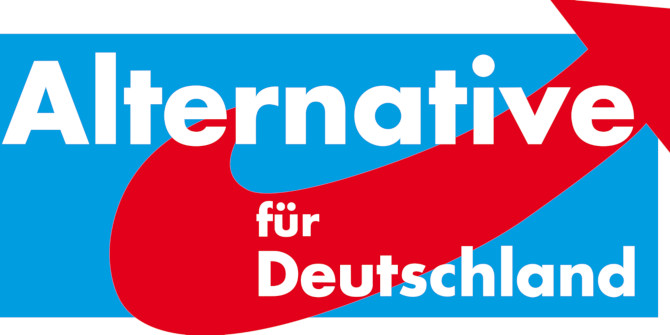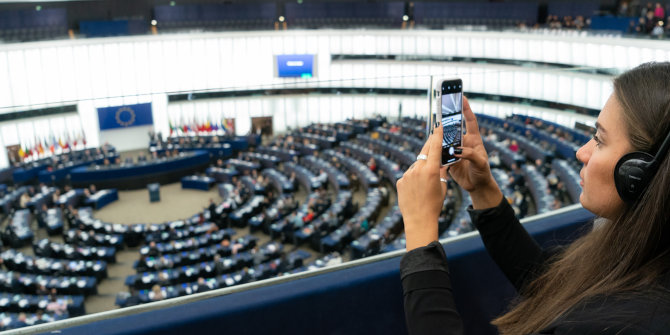The German Social Democrats have experienced a rapid rise in support and now hold a lead in the opinion polls ahead of Germany’s federal election on 26 September. Uğur Tekiner explains how the party has managed to successfully build momentum behind their chancellor candidate, Olaf Scholz.
With just a few weeks of campaigning to go until Germany’s federal election, the race between the main German parties is heating up. The federal election will be the first since 1949 in which the incumbent chancellor will not run for office. For much of the past year, opinion polls have put the Christian Democrats (CDU/CSU) ahead. In April and May, the German Greens rose to take the lead, but the CDU/CSU once again moved into first place over the summer.
Yet despite trailing in the polls for much of the campaign – and largely being written off as a contender to become the largest party – the German Social Democrats (SPD) have in the last few weeks taken a surprise lead. The SPD now sit at around 25 per cent of the vote in the latest polling, with a clear advantage over the CDU/CSU.
The revival of the SPD
There are at least three main factors that have helped the SPD secure such a dramatic rise in support. First, Angela Merkel’s government has encountered a notable decline in popularity. During her 16 years in office, Merkel was generally considered to have taken charge of even the most serious challenges, such as the Eurozone and migration crises. However, the government’s handling of the Covid-19 pandemic has been widely viewed as a low point by German voters.
Moreover, much like in the final years of the Helmut Kohl era, the Merkel government has recently been shaken by a number of scandals, namely the so called ‘mask affair’ and the ‘Wirecard scandal’. Amid growing criticism of the government’s handling of the pandemic, three Christian Democrat MPs resigned due to their alleged financial involvement in the purchase of face masks. Meanwhile, the collapse of the German fintech giant Wirecard, with €1.9 billion missing in its accounts, has been viewed as one of the biggest financial fraud cases in recent history. These events have not only troubled Merkel in the last phase of her chancellorship, but have also seriously impaired the reputation of the Christian Democrats as a credible party of government.
Second, the governing CDU has been overwhelmed by continuing friction over who should succeed Merkel as the party’s leader and chancellor candidate. Annegret Kramp-Karrenbauer was elected as the new CDU leader in 2018, but stepped down last year following a crisis in Thuringia, where the local CDU party received heavy criticism for aligning itself with the far-right Alternative for Germany (AfD) and the conservative-liberal Free Democrats (FDP).
Armin Laschet, the state premier of North Rhine-Westphalia, was elected to succeed Kramp-Karrenbauer as the new CDU leader. He was subsequently backed as the CDU/CSU candidate for chancellor, but only after a fierce battle with the CSU leader, Markus Söder. In contrast to Olaf Scholz, who was unofficially declared by the SPD as its chancellor candidate in August 2020, Laschet’s candidacy was only confirmed a few months ago.
Added to this, Laschet has received criticism over contentious policies pursued in North Rhine-Westphalia during the pandemic. He has made frequent gaffes and was forced to apologise after facing accusations of plagiarism in relation to a book he published in 2009. A separate apology was issued after he was caught on video laughing during a statement given by German President Frank-Walter Steinmeier in the flood-hit town of Erfstadt. Annalena Baerbock, the first ever chancellor candidate that the Greens have put forward for election, has faced her own difficulties in recent months, including accusations of plagiarism and claims that her CV contains inaccuracies.
Finally, and most importantly, the personal rise of Olaf Scholz has been decisive. At the last federal election, the SPD’s candidate for chancellor, Martin Schulz, experienced an early increase in support before the party’s polling numbers slumped prior to the election. In stark contrast to the fading of this ‘Schulz effect’, the ‘Scholz effect’ has proven to be far more resilient this time around.
Scholz has established himself as a clear favourite in polls asking voters to indicate their preferred chancellor candidate. His high ratings and the difficulties faced by Laschet and Baerbock have helped bring the SPD back into contention. Scholz has successfully emphasised his political and governmental experience during a highly focused election campaign. His strategy of pitching himself as a continuity candidate who will act as a natural successor to Merkel has also been highly effective.
What might a Scholz government look like?
Scholz has based his campaign on three main themes: ‘respect’, ‘a policy programme for the 2020s’, and ‘a new European policy’. He has promised a fresh start for Germany. However, his vision of change is not without its critics. As a politician from the right of the SPD, Scholz is known for his pragmatic views, and this may ultimately disappoint voters expecting a radical break with the policies of the previous Merkel governments.
His concrete electoral pledges include a €12 per hour minimum wage, a 1% wealth tax, the construction of 400,000 homes a year, and higher public investment. Scholz has also overseen a generous stimulus package for German businesses and workers during the pandemic and this may give some clues about his future policy direction. This said, a narrow victory at the election may not be enough for the SPD to implement the kind of programme Scholz envisages. As ever, much will depend on the coalition options that emerge from the election.
These include a so called ‘Kenya coalition’ of the SPD, CDU/CSU and the Greens; a ‘Germany coalition’ of the SPD, CDU/CSU and FDP; a ‘traffic light coalition’ of the SPD, Greens and FDP; and a ‘Jamaica coalition’ of the CDU/CSU, Greens and FDP. Of the other alternatives, a coalition bringing together the SPD, Greens and the left-wing Die Linke has become one of the most hotly debated.
Indeed, such a coalition is currently governing the state of Thuringia, but the idea of an entirely left-wing federal government that contains Die Linke has drawn harsh criticism, particularly from the conservative alliance, including Merkel. However, given that Scholz has not entirely ruled out this possibility and has often stated that it is possible to form a government without the CDU/CSU, the option remains on the table.
Amid all the uncertainty, the German election is now wide open. The only thing that appears certain is that the results will not bring an end to the discussions, with potentially several months of coalition talks lying ahead. Whatever happens, the political landscape is bound to change in the aftermath of Angela Merkel’s leadership, but this change will not come easily.
Note: This article gives the views of the author, not the position of EUROPP – European Politics and Policy or the London School of Economics. Featured image credit: European Council






3 Comments